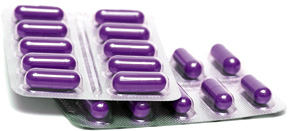The Purple Pill Myth
By Dr. Marlene Merritt
Acid indigestion and heartburn are key indicators of poor digestive health. In today's world, there are numerous pills on the market to help ease the symptoms of these digestive disorders, but are they doing more harm than good?
The ads are all over the TV and splashed across the pages of your favorite magazines – if you have heartburn or acid indigestion, you should be taking an acid-reducing medication, preferably for the rest of your life.
Part of what the ads say is true: It's dangerous to have acid reflux and it is vital to stop it before it does permanent damage. However, turning off the acid in your stomach, whether it's with a purple pill or an antacid, or even taking acid-suppressing Chinese herbs, will lead to a myriad of other problems. It will also not address the root of the problem. Many practitioners simply try to neutralize the acid, which is only a symptom of the root problem.
 Doctors today treat many people with acid reflux, sour stomachs, gas/bloating and other digestive symptoms. Yet most patients are suffering not from too much stomach acid, but not enough. Not enough? How can that be?
Doctors today treat many people with acid reflux, sour stomachs, gas/bloating and other digestive symptoms. Yet most patients are suffering not from too much stomach acid, but not enough. Not enough? How can that be?
The function of your stomach acid is to digest protein. When someone has their stomach acid "turned off," they can't digest well. That means when someone eats, say, a piece of chicken, it lands in the stomach, and needs hydrochloric acid to break it down. When there isn't enough hydrochloric acid, the protein sits in the stomach, it starts to putrefy, creating acid and gases. Now, the person might have some symptoms – a sour stomach, belching, or even acid reflux. But this all happened because they initially didn't have enough acid to digest properly.
On the other hand, if you have adequate amounts of stomach acid, it closes the upper sphincter of the stomach when you eat to prevent that good acid from going up into the esophagus. It also opens the lower sphincter to empty your stomach after the food has been digested. But if you don't have enough acid, not only can you not digest the protein; the upper sphincter also doesn't close tightly enough, causing acid reflux and potential damage to the esophagus. Low stomach acid also causes the lower stomach sphincter to stay closed, which leads to the symptom of "fullness after eating." It's not the normal feeling of being full after eating – it's being overly full because the stomach isn't emptying properly.
You need good acidity to absorb minerals like calcium, iron, magnesium, copper and zinc. There are schools of thought that contend not-low-enough stomach pH is the root of many health problems, and considering that magnesium, for example, is used in literally hundreds of enzyme reactions, this is probably not far from the truth. People with poor stomach acid also cannot absorb vitamins C, K, and the B complex vitamins. Think of all the people taking calcium, for example – the majority are unable to absorb them, especially because stomach acid production declines as you age.
Did you know that the pH of your stomach, when it's healthy, is between 1 and 2? There's a reason it's that low – your stomach is the first line of defense for your immune system. You know all those people with sinus infections and post-nasal drip? That infected material drips down into the stomach, where, if the person has good acidity, it kills off any bacteria. Or what about bacteria in foods? Or possibly parasites? Again, good acidity can help kill off anything that might cause food poisoning or infestations of any kind.
And then there are the bacteria of your gut – it's not a mistake that they're called "acidophilus." Those bacteria want to live in an acidic environment. When our gut is not acidic enough, it is nearly a waste to take the probiotics that so many people are ingesting because they don't have the acidic environment required to survive. Not having an acidic-enough environment allows detrimental bacteria like Candida to survive and flourish.
Cutting out sugars, yeast, etc., is not enough to treat Candida – the digestive tract has to become acidic enough to kill off the detrimental bacteria as well as provide an environment for the correct flora.
The entire digestive process is orchestrated by good stomach acid. If there isn't enough, the gallbladder doesn't get triggered properly to function, and the pancreatic enzymes aren't released for proper digestion.
So, knowing the vital functions of stomach acid, it seems absolutely insane to take antacids or proton-pump inhibitors such as that little purple pill, doesn't it?

